M5U1Great scientists warming up&reading
高中英语 Unit 1 Great scientistWarming Up and Reading 教案 新人教版必修5
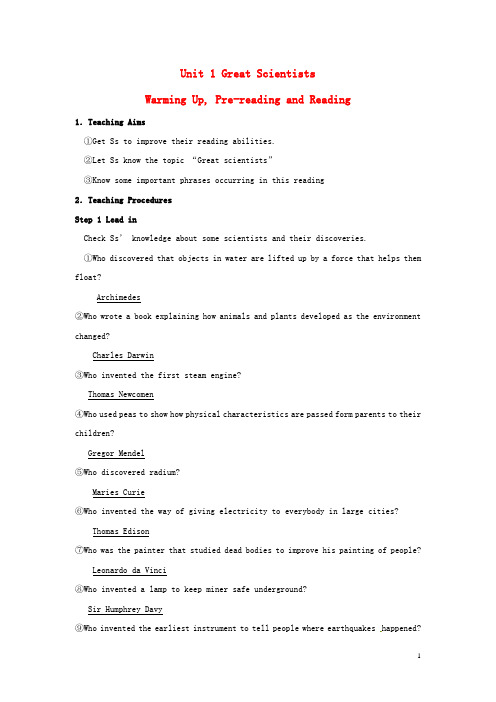
Unit 1 Great ScientistsWarming Up, Pre-reading and Reading1.Teaching Aims①Get Ss to improve their reading abilities.②Let Ss know the topic “Great scientists”③Know some important phrases occurring in this reading2.Teaching ProceduresStep 1 Lead inCh eck Ss’ knowledge about some scientists and their discoveries.①Who discovered that objects in water are lifted up by a force that helps them float?Archimedes②Who wrote a book explaining how animals and plants developed as the environment changed?Charles Darwin③Who invented the first steam engine?Thomas Newcomen④Who used peas to show how physical characteristics are passed form parents to their children?Gregor Mendel⑤Who discovered radium?Maries Curie⑥Who invented the way of giving electric ity to everybody in large cities?Thomas Edison⑦Who was the painter that studied dead bodies to improve his painting of people?Leonardo da Vinci⑧Who invented a lamp to keep miner safe underground?Sir Humphrey Davy⑨Who invented the earliest instrument to tell people where earthquakes happened?Zhang Heng⑩Who put forward a theory about black holes?Stephen HawkingAfter all the questions, then lead in the passage with a picture. Ask ss if they know the map and what it is used for. Give them the answer later “It is a map to find out the cause of Cholera. ”Step 2 Skim and ScanMore questions are given to get the general ideas of this passage and some obvious facts.Who defeats “King Cholera“? John SnowWhat happened in 1854? Cholera outbreak hit London.How many people died in 10 days? 500Why is there no death at No. 20 and 21 Broad Street as well as at No. 8 and 9 Cambridge Street?These families had not drunk the water from the Broad Street pump.Step 3 Reading for details1 Why couldn’t the ch olera be under control at first?Neither its cause, not its cure was understood.2 Which theory did John Snow believe in?People absorbed cholera into their bodies with their meals.3 John Snow finally proved the theory he believed by ________.gathering information with the help of a maplooking into the source of the water for Broad Street and Cambridge Street Separating those who suffered cholera from those who didn’tBoth A and B (right choice)4 To prevent the cholera from spreading again, what did John Snow do? Suggested that the source of all water supplies be examine. Suggested that new methods of dealing with polluted water be found. Instructed the water companie s not to expose people to the polluted water anymore.Step 4 Mind map of the passageParagraph 1: Introduction of John Snow and Ch oleraParagraph 2: Two theoryParagraph 3-5: Study of the breakout in 1854Paragraph 3: Think of a method: Test two theoryCollect the result: Mark the deathAnalyze the result: Reason for death and no deathParagraph 4: Analyze the result: Find the resource of the waterParagraph 5: Repeat if necessary: Find more evidence.Draw a conclusion: Cholera was spread by germPolluted water carried choleraParagraph 6: Prevention of CholeraStep 5 Retell the passageProvide ss with a summary with some blanks. Let them retell the passage as well as pay attention to some important words.Read the passage again and fill in the blanks:John Snow was a well-known ____ in London in the ___ century. He wanted to find the ______ of cholera in order to ______ it. In 1854 when a cholera ____ out, he b egan to gather information. He _____ on a map where all the dead people had lived and he found that many people who had drunk the dirty water from the ______ died. So he decided that the polluted water carried cholera. He suggested that the _____ of all water supply be _______ and new methods of ________ with polluted water be found. Finally, “King Cholera” was defeated.Step 6 HomeworkRead the whole passage and retell.Go to the net to get more information about UK.。
M5U1 Great Scientists - Warming up
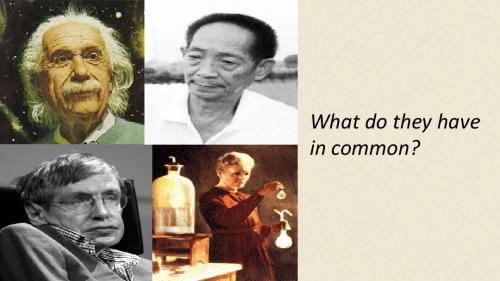
Who is he?
Who discovered radium? Marie Curie Nothing in life is to be feared. It’s used in the treatment ofIt is only to be understood. some diseases, especially cancer.
Stephen Hawking
Who is the scientist that you admire and appreciate most? Why? What can you learn from him or her?
What makes a scientist successful and great?
Humphry Davy
Who is he?
Who invented the earliest instrument to tell people where earthquakes happened? Zhang Heng
Who is he?
Who put forward a theory about black holes?
Give me a place to Archimedes stand on, and I will move the earth.
Who is he?
Who wrote a book explaining how animals and plants developed as the environment changed?
Charles DarwinWho is he?Who invented the first steam engine?
James Watt
高中英语 Unit 1 Great Scientists(第1课时)Warming up教案 新人教版必修5
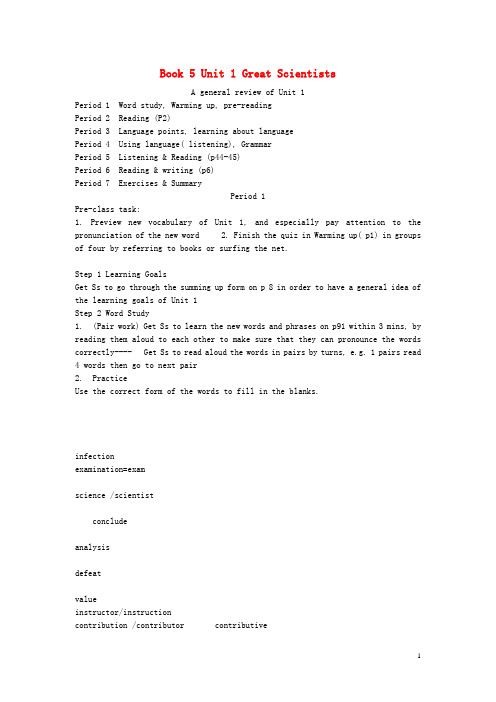
Book 5 Unit 1 Great ScientistsA general review of Unit 1Period 1 Word study, Warming up, pre-readingPeriod 2 Reading (P2)Period 3 Language points, learning about languagePeriod 4 Using language( listening), GrammarPeriod 5 Listening & Reading (p44-45)Period 6 Reading & writing (p6)Period 7 Exercises & SummaryPeriod 1Pre-class task:1. Preview new vocabulary of Unit 1, and especially pay attention to the pronunciation of the new word2. Finish the quiz in Warming up( p1) in groups of four by referring to books or surfing the net.Step 1 Learning GoalsGet Ss to go through the summing up form on p 8 in order to have a general idea of the learning goals of Unit 1Step 2 Word Study1. (Pair work) Get Ss to learn the new words and phrases on p91 within 3 mins, by reading them aloud to each other to make sure that they can pronounce the words correctly---- Get Ss to read aloud the words in pairs by turns, e.g. 1 pairs read 4 words then go to next pair2. PracticeUse the correct form of the words to fill in the blanks.infectionexamination=examscience /scientistconcludeanalysisdefeatvalueinstructor/instructioncontribution /contributor contributivecreatecalculatemovecompletionenthusiasm3. Fill in the blanks using the new words in this unit1) Mrs. White bought a pan with a long ________. (handle)2) The pollution is so ________ that we have to take some measures to stop it. (severe)3) He has a big nose that is a ________ of his family. (characteristic)4) Water and salt are ________ into our blood stream every day. (absorbed)5) If a doctor or a medical treatment ________ someone’s illness, they make the person well again. (cure)Step 3. Warming up(Group competition) Check the answers to the quiz to find out which group knowthe most . Show pictures to introduce some scientists while Ss giving the correct answers-- congratulations to the winning groupStep 4 Pre-reading1. (Pair work) What five most important qualities do you think a scientist should have? Give reasons.clever/talented strict patient creative determined/strong-willed positive honest energetic intelligent/hard-working ambitious careful co-operative confident brave2. (Group work) Ex2, p1Do you know how to prove a new idea in scientific research? Discuss in groups the stages in examining a new scientific idea. What order would you put them in?Draw a conclusion Think of a method Collect results Make up a question Find a problem Analyse the resultsStep 5. Summary1. Seeing much, suffering much, and studying much are three pillars (支柱,要素)of learning.2. learning without thought is a labour lost; thought without learning is perilous(危险的)3. To know the disease is half the cure. 找出病根等于医治了一半。
人教版 必修五 unit1 great scientists warming-up
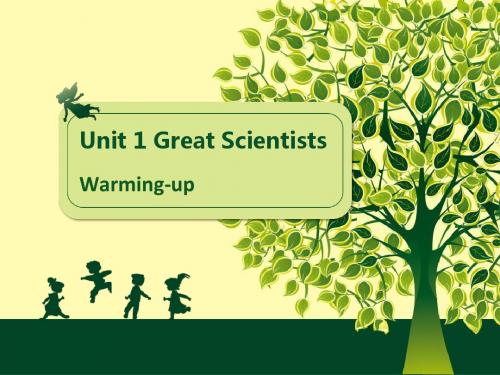
Seismograph 地震仪
• 1. I was an American. • 2. I invented electric light bulb(电灯泡). • 3. I invented the way of giving electricity to everybody in large cities.
Stages in examining a new scientific idea
1.Draw a conclusion: (得出结论)
2.Think of a method:
3.Collect results: 5.Find a problem:
(找出研究方法)
(收集材料) (发现问题)
4.Make up a question: (形成研究主题) 6.Analyse results: (分析材料)
times and it Uncontrolled was very difficult to de If you want to be a scientist in the future, what do you want to solve or invent?
Repeat if necessary
Draw a conclusion
Homework:
• Learn the new words of this unit • Read the passage of John Snow
Defeats "King Cholera".
From:
Charles Darwin 达尔文
1. I am Englishman. 2. I’ve worked in astronomy. 3. I’ve put forward a theory about black holes.
Unit 1 Great Scientists warming up课件 新人教版必修5课件
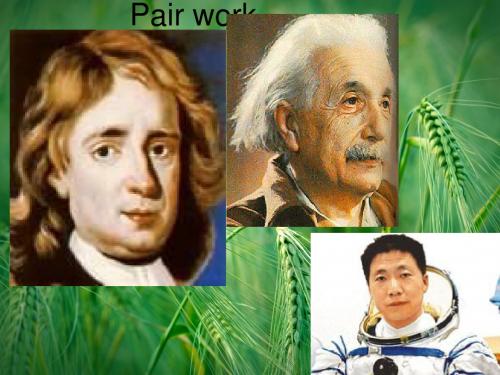
Stephen Hawking,British(1942--- )
He has worked in astronomy and studied black holes in space. He has shown that black holes do not only absorb everything around them but, from time to time, throw out matter as well. This may mark the beginning of new galaxies. This is an advance on the old theory which said that black holes “eat” everything they come across.
• Give me a place to stand on, and I can move the earth. ----Archimedes
Charlie Darwin(1808-1882)
Britain naturalist. The Origin of Species was published in 1859. It explained how plants and animals had changed over time to fit in with a changing environment. His book showed that people had developed form apes.
Leonardo da Vinci(1452-----1519)
He was a famous Italian artist whose skill for showing human skin tones made his paintings seem to come alive. He used to study dead people in order to make his paintings as accurate as possible. Some of his famous paintings include “The smile of Mona Lisa” “The Last Supper”. Later in his life he lived in France where he designed a submarine and a flying machine.
module 5 unit 1 Great Scientists warming up&re

5oo deaths in 10 days in 1854 in London.
Many deaths in African countries in 2005 and even now
Cholera:
• It begins in the stomach and a severe case can lead to death without immediate treatment.
A woman and her daughter who lived far away but drank the water also died.
draw a conclusion with certainty
The polluted water carried the virus.
What advice did John Snow give ?
• And the victims died very quickly from a loss of liquid after severe vomiting(呕吐) and diarrhoea(腹泻).
Who is John Snow?
a famous doctor in London.
attended her to ease the pain of the birth of
Neither its cause, nor its cure was understood. deadly disease
Spread from one person to another. So it is an infectious disease.
Who made a great contribution in fighting against SARS?
《Unit1greatscientistwarmingup》课件六十三(9张PPT)(人教版必修5)
What do you know about infectious diseases? •Infectious diseases can be spread easily. They have an unknown cause and may do great harm to people.
•People could be exposed to infectious diseases, so may animals, such as bird flu.
•AIDS, SARS are infectious diseases. They are difficult to cure.
What do you know about cholera?
Do you know how to prove a new idea in scientific research?
Book5 Unit1
Great scientists
Charles Darwin, Britain (1808-1882).The name of the book is Origin of Species.
Archimedes, Ancient Greek (287-212 BC), a mathematician.
Thomas Edison, American, an inventor. He invented the lights and the gramophone.
Marie Curie, Polish and French, a chemist and physicist. She discovered radium.
James Watt (1736-1819) was a Scottish inventor and mechanical engineer, who was renowned for his improvements of the steam engine.
人教版高中英语第一单元warmingup翻译
人教版高中英语必修5Unit1 Great scientistsWarming up译文1.which scientists discover help objects floating in the water?译文.哪一位科学家发现了帮助物体在水中漂浮的力?2.Who wrote a book explaining how animals and plants developed as the environment changed?译文.谁写了一本书来解释当环境改变时动物和植物是如何变化的?3. who invented the first steam engine?译文.谁发明了第一台蒸汽机?4. Who used peas to show how physical characteristics are passed from parents to their children?译文.谁用豌豆做实验来研究人的身体特征是这样从父母遗传给孩子的?5. who discovered Radium?译文.谁发现了镭?6.Who invented the way of giving electricity to everybody in large cities?译文.谁发明了将电力输送到大城市千家万户的方法?7. Who was the painter that studied dead bodies to improve his painting of people?译文.哪一位画家通过研究尸体来改进他的人体绘画?8.Who invented a lamp to keep miners safe underground??译文.谁发明了矿灯来使井下的矿工得到安全?9. Who invented the earliest instrument to tell people where earthquakes happened?译文.谁最早的发明了告诉人们哪里发生地震的仪器?10.Who put forward a theory about black hole?译文.谁提出了关于黑洞的理论?。
高中英语新人教必修五Unit1GreatscientistsWarmingupReading
C. Thomas Edison
教学ppt
6
“Give me a place to stand on, and I can move the earth.”
Archimedes
“给我一个支点,我就可以翘起整个地球.”
教学ppt
7
2. Who wrote a book explaining how animals and plants developed as the environment changed?
教学ppt
18
10.Who put forward a theory about black holes?
A. Stephen Hawking B. Archimedes C. Copernicus
教学ppt
19
Black hole
Stephen Hawking (1942--) British, a physicist
Warming up& Reading Book 5,Unit 1
教学ppt
1
What do they have in common?
They are scientists
教学ppt
2
Unit 1
Great Scientists
教学ppt
3
What do you know about them ?
约翰.斯诺
教学ppt
27
Speaking
Who is your favorite scientists? Why ?
教学ppt
28
Reading
教学ppt
29
It infects people’s intestines(肠道),
人教新课标必修五 Unit1 Great scientists-Warming up[课件]
Archimedes 阿基米德
Archimedes, Ancient Greek (287-212 BC), a mathematician.
2. Who wrote a book explaining how animals and plants developed as the environment changed?
Charles Darwin达尔文
Charles Darwin, Britain (18081882).The name of the book is Origin of Species.
3. Who invented the first advanced steam engine? James Watt瓦特
7. Who was the painter that studied dead bodies to improve his painting of people?
Leonardo da Vinci 达芬奇Leonardo da Vinci,
Italian, an artist.
8. Who invented a lamp to keep miners safe underground?
6. Who invented the way of giving electricity to everybody in large cities?
Thomas Edison 爱迪生
Thomas Edison, American, an inventor. He invented the lights and the gramophone.
3.The following measures should be taken to prevent cholera except________ A.Always drinking beer B.Instructing the water companies not to expose people to polluted water any more C.Examing all water supplies D.Finding new methods of dealing with polluted water.
- 1、下载文档前请自行甄别文档内容的完整性,平台不提供额外的编辑、内容补充、找答案等附加服务。
- 2、"仅部分预览"的文档,不可在线预览部分如存在完整性等问题,可反馈申请退款(可完整预览的文档不适用该条件!)。
- 3、如文档侵犯您的权益,请联系客服反馈,我们会尽快为您处理(人工客服工作时间:9:00-18:30)。
Homework: do your own research
Stages: 1.Find a problem 2.Make up a question 3.Think of a method 4.collect results 5.Analyse results What/How?
6. Find supporting evidence 7.Make a conclusion
A hint: A monk who used pea plants to carry out his experiments
In 1865,Mendel showed the world his achievement after eight years’ research , including the experimental data from 29,000 pea plants ,to test and prove his idea.
Fast reading
• Who was John Snow? • When and where did the story take place? • What is cholera?
Who is John Snow?
He was a famous doctor in London.
When and where did the story take place? In 1854 (Voctorian era) Lel the fruits Wash hands often Cook raw food thoroughly Do not eat anything local. Take water and food by yourself
"Boil it, cook it, peel it, or forget it."
Many deaths happened here.
Public house
No death happened here.
The water from the pump was to blame.
Stage 5.analyze the results: What happened to the pump water?
what did John Snow do to prevent the cholera from spreading again?
Examine the source of all water supplies;
not expose people to the polluted water.
Cholera still exists nowadays!
Gregor Mendel
(1822-1884)
Father of Modern Genetics
from Czech
Do you know how to prove a new idea in scientific research?
Draw a problem Find a conclusion
Find supporting evidence Analyse the results Find supporting evidence Draw a conclusion
John Snow Defeats ”King Cholera”
Defeat:to beat with hard work King:1.a ruler of the country 2.a thing that is difficult to deal with
What caused cholera?
Stage 2.make up a question:
Cholera multiplied in the air. People absorbed it with their meals.
Which theory is correct?
Stage 3&4. think of a method &collecting results What method did he use? With an outbreak in 1854, John Snow enquiry was ready to begin his________ in two two streets particular __________. First, he marked on a ______ the exact places where all map the dead people had_______. (numbers lived ___,___,___ and___ had the most deaths.) 16 37 38 40 He also noticed that some houses (such 20 21 8 as___ and___ Broad street and ___ and ___ Cambridge street) had no deaths. 9
U1M5 Reading Great scientists
gene
Why do they look alike?
Which scientist discovered the fact how physical characteristics are passed from parents to their children?
consolidation:
Stages: 1.Find a problem What/How? the _______ of the deadly cause Cholera had not been found
2.Make up a question which theory was correct______? ______ correct 3.Think of a method using a _______ map 4.collect results mark _______ the deaths on the map 5.Analyse results ______ had been polluted. water 6. Find supporting evidence 7.Make a conclusion find two other deaths to _______________ make sure the conclusion ____________ carried the disease polluted water
A woman and her daughter who lived far away but drank the water also died.
Stage 7.draw a conclusion with certainty
The polluted water carried the disease.
Thank you!
please put the 7 stages in right order
Make up a method Think of a question
Collect results Think of a method
Collect results Make up a question
Find a problem Analyse the results
The water was from the river which had been polluted by the dirty water from London.
Stage 6.Find supporting evidence: What extra evidence did he find?
• What is cholera? • It was a deadly disease of its day .
Careful Reading
Stage 1. find a problem What was the problem for doctor John Snow?
Neither its cause, nor its cure was understood.
Fever diarrhea(腹泻) vomiting(呕吐) leg cramps(抽筋) Loss of body water
Death
What should you do if you're travelling to a country that has a cholera outbreak?
